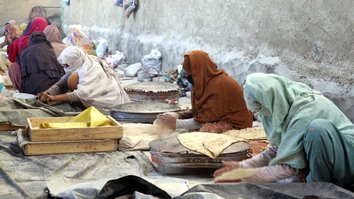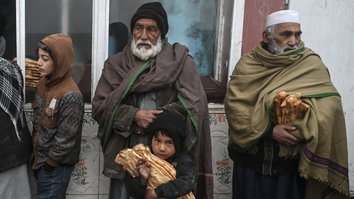KABUL -- In the early hours of each morning, Muhajira Amanallah rushes in freezing temperatures to a modest bakery in Kabul to wait for warm naan bread to be distributed.
On some days, it is all her family, and the others who have joined the queue, will eat for the day.
"If I don't bring bread from here, we will go to bed hungry," the mother of two told AFP on Tuesday (January 18).
"I even thought of selling my daughters, but I backed down and relied on God alone."
![People stand as they receive free bread distributed as part of the Save Afghans From Hunger campaign in front of a bakery in Kabul on January 18. [Wakil Kohsar/AFP]](/cnmi_st/images/2022/01/21/33636-000_9we472-585_329.jpg)
People stand as they receive free bread distributed as part of the Save Afghans From Hunger campaign in front of a bakery in Kabul on January 18. [Wakil Kohsar/AFP]
Poverty and hunger are driving desperate Afghans to make the terrible choice to sell their daughters, whose dreams of education and freedom have withered away following the collapse of the government in mid-August.
Afghanistan is in the grip of a humanitarian disaster, and the United Nations (UN) on January 11 said it needs $5 billion in aid to avert a humanitarian catastrophe in 2022.
The same day, the US government promised more than $308 million in an initial aid package for Afghanistan this year. Since October, US humanitarian aid for Afghans has totalled almost $782 million.
The UN has warned that 23 million people -- more than half of the country's population -- are threatened with food shortages.
Jobs have dried up, and many government workers have not been paid for months in the country, which was almost entirely dependent on foreign donations under the previous government.
Washington has frozen billions of dollars of the country's assets, while aid supplies have been heavily disrupted.
Afghanistan also suffered its worst drought in decades in 2021.
Save Afghans From Hunger
The bread distribution launched last Saturday is part of the Save Afghans From Hunger campaign organised by a Kabul university professor.
At least 75 families in seven districts of the capital, currently blanketed in snow, will receive 10 pieces of naan daily for a month, according to the campaign's donation page.
"The bread costs 9 AFN so it will cost us $64 to feed 75 families every day," it said, noting that the campaign will expand to reach 200 families a day starting next week.
In the queue, Nouriya stands alongside five other women, all in the blue burqa that the Taliban encourages women in the country to wear.
After the death of her husband, she got handouts from friends, but that has ended.
"We eat rice or soup made with carrots and turnips... and we put pieces of bread in it instead of meat," said Nouriya, a mother of five.
While men and women wait for their share of bread, children play, some wearing tattered shoes too big for them.
"People have lost their jobs, and they no longer have any income," said bakery owner Makram el-Din as the last person left the queue. "We used to use four sacks of flour a day; now we use only one and a half."

![A baker cleans the window of a bakery as people wait to receive free bread distributed as part of the Save Afghans From Hunger campaign in Kabul on January 18. [Wakil Kohsar/AFP]](/cnmi_st/images/2022/01/21/33637-000_9we47f-585_329.jpg)
![A baker works at a bakery in Kabul that is distributing free bread to some families as part of the Save Afghans From Hunger campaign, on January 18. [Wakil Kohsar/AFP]](/cnmi_st/images/2022/01/21/33638-000_9we47g-585_329.jpg)
![Women receive free bread distributed as part of the Save Afghans From Hunger campaign in front of a bakery in Kabul on January 18. [Wakil Kohsar/AFP]](/cnmi_st/images/2022/01/21/33647-000_9we477-585_329.jpg)
![A woman walks along a road towards her home after receiving free bread from a bakery in Kabul on January 18. [Wakil Kohsar/AFP]](/cnmi_st/images/2022/01/21/33648-000_9we47b-585_329.jpg)
![The Save Afghans From Hunger campaign has been distributing free naan to 75 families in Kabul. [Wakil Kohsar/AFP]](/cnmi_st/images/2022/01/21/33649-000_9we47d-585_329.jpg)
![People wait to receive free bread distributed as part of the Save Afghans From Hunger campaign in front of a bakery in Kabul on January 18. [Wakil Kohsar/AFP]](/cnmi_st/images/2022/01/21/33650-000_9we46w-585_329.jpg)
![Those men have just received free bread distributed as part of the Save Afghans From Hunger campaign in Kabul on January 18. [Wakil Kohsar/AFP]](/cnmi_st/images/2022/01/21/33651-000_9we47w-585_329.jpg)
![Children wait to receive free bread from a bakery in Kabul on January 18. [Wakil Kohsar/AFP]](/cnmi_st/images/2022/01/21/33652-000_9we47n-585_329.jpg)







Thanks to Salaam Times for following up on such issues, and making reports on them so that people can read and be inspired, and all the people can act like this university professor. All the people should welcome this action, and consider it important and make it their national duty. There is a prover in Pashto language that says: “one flower doesn’t bring the spring”, and this proverb is true in this case as well, because with the compassion and kindness of one Afghan, poor people cannot be fed, but all the people must help the needy as much as they can, so that they are not left alone in this harsh winter and at these bad times of unemployment and poverty. Some of our rich people are so immoral that they see the same poverty and hunger of our people and they still take their money to Hajj and spend it there. Hey people! If you are seeking the real Hajj, feed the hungry people, treat the sick people, cover the naked people, this is the real Hajj and this will cause your forgiveness by Allah, otherwise you do not deserve forgiveness at all, and if you do not do so, I swear to Allah that you will not see the face of heaven.
ReplyEverything you said is all that is needed. Feed the hungry. Cloth the naked. Be kind because our one true God sees all. Watching this brings my heart to a very low place. Beautiful people suffering because of our material world and greed and exploitation. It's hard for me to look into the children's eyes. The suffering. I just keep praying for them and praying that one day they will know joy.
Reply3 Comment
Money exists in Afghanistan, but the problem is that there is no system. Unfortunately, there has been no system in place for 20 years to collect regular taxes from rich people and, as in Western countries, help families and individuals who are unemployed or have disabilities. In the last twenty years, if twenty (money) came, twenty would be stolen by thieves and former warlords, and if one hundred came, one hundred would be stolen. SIGAR reports have proved these claims well. Another point is that we have many bad neighbors. Pakistan is on one side, Iran is on the other side, Russia is on the other side, and China, which has not yet launched a direct armed attack on Afghanistan, is counting days and nights to loot our mineral sources. I mentioned China's direct armed attack because they have carried out indirect attacks. One of our villagers swore that Coalition Forces' tanks would pass through the village and have planted a bomb for them, but when the tank reached the bomb and pressed the bomb's remote control, it did not explode. Then they shared the issue with the Pakistani army officer, who was in touch. He spoke with his superiors (in the Pakistani army). China was informed that the remote controls they had given would not work. China then sent new remote controls within days. The bombs began to explode when the controls were used. They were our neighbors who treated our government's international allies this evil way.
Reply3 Comment